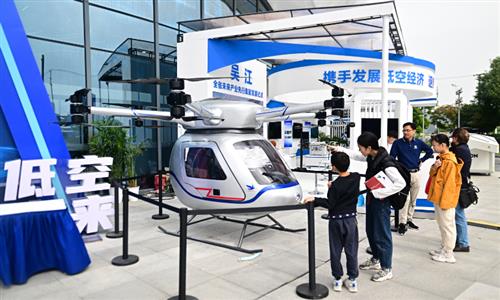2024 Yearender: China's Gen Z embracing anime, comic and game, sparks new wave of 'goods economy'

The animation-themed section of a shopping center draws visitors in Chengdu, Southwest China's Sichuan Province, on October 6, 2024. Photo: VCG
Editor's Note:Despite a complex international environment, foreign financial institutions have kept on increasing their investment in Chinese market in 2024, eyeing huge dividends brought about by the country's long-term development potential. At the critical moment for promoting high-quality economic growth, a series of important meetings and pro-growth policies set the direction for the reform and opening-up. This article is one of a series looking back at China's economic work this year and also sheds light on domestic consumption.

This year's economic buzzwords would be incomplete without the youth-driven "goods economy," a consumer phenomenon rooted in anime, comic, and game (ACG) culture. The new consumption trend has recently made waves in the A-share market, it marks the rise of a new consumer demographic that underscores the vitality of China's economy.
The "goods economy" pronounces as guzi jingji in Chinese. It originates from ACG culture, specifically referring to merchandise deriving from content-centric goods like comics, animations, video games, idols, and tokusatsu (a Japanese word that literally means "special effects"), including items like badges, posters, cards, keychains, standees, figurines, and dolls.
Emotional value
A 26-year-old ACG fan surnamed Xu told the Global Times on Tuesday that she initially spent around 3,000 yuan ($412) per month, but after collecting a good number of ACG-related items, her spending has since dropped to about 1,000 yuan per month now. Xu mostly buys plush toys, including items like badges, holographic tickets, bracelets, and necklaces.
"The design has to be appealing first, and I would consider its value, like whether it was released on a special date. The emotional value of the goods outweighs the material value - whenever I'm feeling stressed, taking a look at them really helps me unwind the pressure," Xu said.
Dong Jiayu, another ACG "goods" enthusiast from Southwest China's Yunnan Province, also spoke highly of the emotional value of the "goods" which bring to her whenever she feels bored.
"It's like putting on nice home décor, and having them neatly displayed in my room with all my favorite ACG characters will truly refresh me. When I'm tired from busy work or studying, just seeing them stay there gives me a boost of motivation," Dong told the Global Times.
"Goods" consumption offers Generation Z a platform to express their emotions and individuality, embodying the concept of 'investing in happiness,' Zhang Yi, CEO of the iiMedia Research Institute, told the Global Times on Tuesday.
"Goods" culture, with its strong social implications, has become a new way for young people to interact and connect with one another. The rapid rise of the "goods economy" shows that young people in China are increasingly focused on achieving self-fulfillment, which will shore up happiness-inducing consumption, Zhang said.
In recent years, ACG has shifted from a niche business to a growing mainstream phenomenon, with its core user base expanding continuously, creating a vast potential consumer market for the so-called "goods economy."
According to iiMedia Research, the market size of China's "goods economy" hit 120.1 billion yuan in 2023, which is predicted to reach 168.9 billion yuan in 2024. With the development of the broader ACG ecosystem and related derivative markets, the "goods economy" is expected to stage sizzling growth in the coming years, with some forecasts claiming the sector's market size will likely reach around 309 billion yuan by 2029.
New consumption trends
More than 10,000 new ACG- related companies were registered from January to November 2024, marking a 14 percent year-on-year increase. At the end of November, the total number of ACG businesses surpassed 64,000, showed data from corporate information platform Tianyancha.com.
The consumption potential of Generation Z youngsters will continue to grow, analysts said.
In May, topics like "Goods stores helping save old malls" even trended on major Chinese social media platforms. Some traditional shopping malls, in the process of being transformed, have leveraged the expanding anime and gaming market by introducing "goods stores" and "goods markets," which have drawn considerable attention from Generation Z shoppers.
For example, the X118 Mall on Jianghan Road in Wuhan, Central China's Hubei Province, saw its foot traffic surge 10-fold after introducing a "goods" store that helped bring a new life to the mall, according to iiMedia Research.
Moreover, the "goods economy" is starting to influence other sectors. For example, following the debut of China's heated online game "Black Myth: Wukong" in August this year, its filming locations have obtained significant attention, especially in North China's Shanxi Province, where much of the game was shot. As a result, people's searching interest in Shanxi's hot tourism sites went up by more than 20 percent in August compared to a year earlier, data from the travel platform Tongcheng Travel showed.
The "goods economy" has gained traction among investors in the A-share market, particularly in the second half of this year. According to Wind.com data, the Wind Goods Economy Index rose by a remarkable 38.89 percent from August 1 to December 4.
Chinese consumers' demand for ACG consumption is constantly building up, driven by the country's economic resilience as well as deeper demographic shifts, according to a report by the CITIC Securities.
On the supply side, China benefits from abundant high-quality ACG resources and an increasingly skilled talent pool. On the demand side, rising cultural confidence, broader audience engagement, and rising consumer spending are set to fuel the new sector's growth, the CITIC Securities said.
The recently held agenda-setting Central Economic Work Conference in Beijing stressed that efforts should be made to vigorously boost domestic consumption in 2025. "Work is needed to innovate more diversified consumption scenarios, expand service consumption, and promote the development of cultural tourism," the meeting noted.
And, the "goods economy" is expected to demonstrate robust growth, which will create a sizable market worth hundreds of billions in the future, Zhang said.



